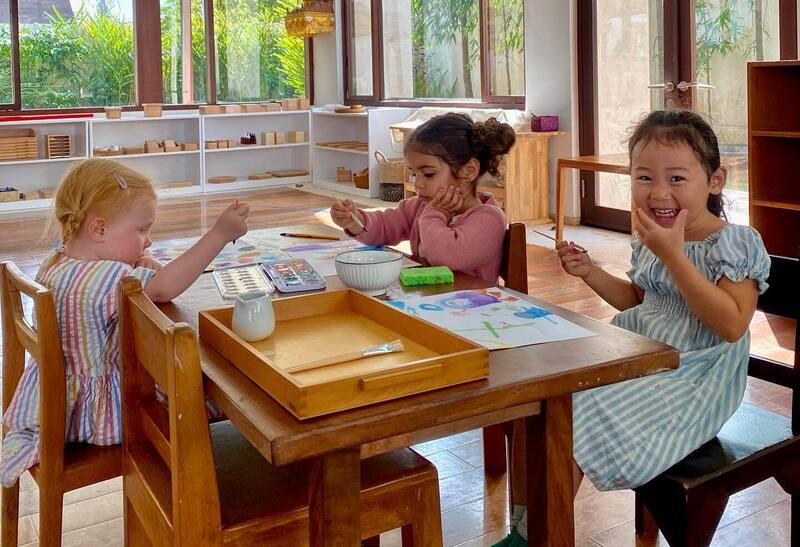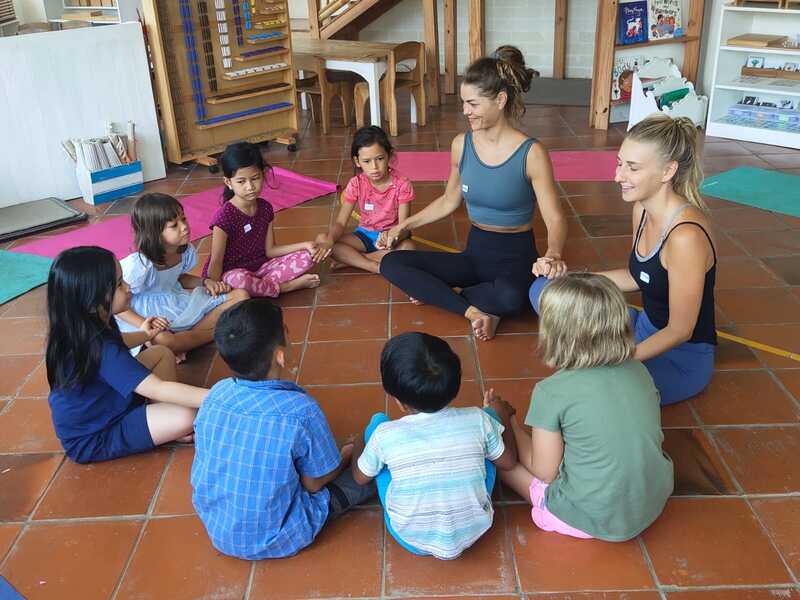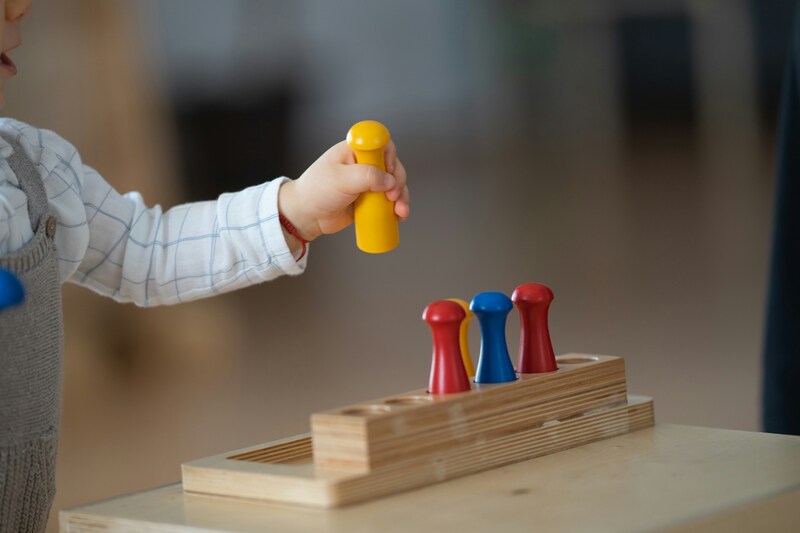The island of Bali beckons to a diverse array of people.
While some merely visit for vacation purposes, others develop a deep affection for the island, choosing to settle down or establish roots here.
Consequently, families formed in this tropical paradise seek unique educational opportunities fit for their offspring. Among the various educational approaches available, one in particular has gained attention for their child-centred philosophy and emphasis on hands-on learning–Montessori schools. However, like any educational model, they come with their own set of pros and cons.
First and foremost, what is a Montessori School?
A Montessori school is an educational institution that follows the principles and methodology developed by Dr. Maria Montessori, an Italian physician and educator. Hailed to be ahead of its time, the method was first introduced in 1907 when Montessori opened her first “Casa dei Bambini” – “Children’s House“. Others would soon follow suit and she continued to develop her method until her death in 1952.
Central to the Montessori approach is the belief that children are inherently curious, capable, and eager to learn, and that education should be tailored to meet their individual needs and interests. A Montessori school has several key characteristics. One of which is that the learning environment is designed to promote independence, exploration, and hands-on learning. Classrooms are typically arranged with a variety of age-appropriate materials and activities that children can freely choose from based on their interests. These materials are curated to support the development of specific skills and concepts across various subject areas, including mathematics, language, science, geography, and practical life skills.
Another key feature of a Montessori school is mixed-age classrooms, where children of different ages (usually spanning a three-year age range) learn together. This allows younger children to observe and learn from older peers, while older children have opportunities to reinforce their learning by teaching and mentoring younger classmates.
The Montessori teacher–often referred to as a “guide” or “directress“–observes each child closely, identifies their interests and developmental needs and provides individualised guidance and support as they explore and learn. Rather than delivering traditional lectures, Montessori teachers facilitate learning by offering demonstrations, asking open-ended questions, and encouraging children to engage with materials independently or in small groups.
By embracing these principles, Montessori schools aim to empower children to become independent thinkers, problem solvers, and compassionate members of society. However, due to the absence of trademark protection for the term, numerous schools today adopt the name of Maria Montessori while only loosely adhering to her educational principles. Although some countries have established official Montessori institutions offering teacher training and accreditation, such affiliations are not obligatory for schools to incorporate the term in their advertising.
Particular to Bali’s Montessori schools, on the other hand, is the unique blend of the Montessori philosophy with the rich cultural and natural environment of the island. Many of them incorporate the beautiful landscape and vibrant tropical spaces into the architecture, as well as the curriculum.
An exemplary institution to observe is Montessori School Bali. The school offers comprehensive programs catering to children from 6 weeks to 15 years of age. Their purpose-built facilities prioritise aesthetics and a connection with nature, providing an enriching environment for learning. All the guides are trained by the Association Montessori Internationale (AMI), ensuring a high standard of education, while the classroom assistants hold university degrees.
The school also prides itself on fostering a strong sense of community. Many parents attest to their children’s enthusiastic accounts of their experiences, often citing them when returning home as “the best day ever.” This vibrant community spirit adds depth to the educational journey at Montessori School Bali.
Montessori School Bali utilises the unique Three-Period-Lesson system, employed to assess student progress. This method effectively introduces new concepts, prompts recognition, and confirms authentic learning. Through continual monitoring, Montessori-trained guides discern when to guide individual students towards reinforcement or collaborative learning opportunities, ensuring a tailored and effective educational experience for each child.
Another notable institution, Sekolah Montessori Erdkinder Bali traces its roots to its founder, Gertraud Neuner, a seasoned expert in Montessori education. With a Bachelor’s degree in Education and rigorous Montessori Diploma Training at ÖMG, aligned with the standards of the Association Montessori Internationale (AMI), Neuner served as a Montessori Principal/Guide in Austria.
The school is a holistic Montessori institution housed within an octagonal structure in Banjar Panglan, Pejeng village, near Ubud. This architectural marvel seamlessly integrates Balinese cultural elements with international sophistication. It adheres to all the core foundations of the Montessori principle, staying true to the name it bears.
They embrace the ethos of “Learning from and in Nature,” boasting a distinct outdoor area replete with an Organic Garden & Playground. Here, children immerse themselves in engaging outdoor activities meticulously designed to align with early childhood developmental needs and foster a deeper connection with nature. From digging and climbing to organic gardening guided by Permaculture Principles, every aspect is curated to stimulate physical, social, and cognitive development.
These respective schools demonstrate the diversity of Montessori schools in Bali, each offering its own unique blend of Montessori principles, cultural immersion, and environmental awareness. Whether nestled in the lush countryside or in the heart of a bustling town, the essence of these institutions is to provide children with opportunities to explore, discover, and thrive in harmony with their surroundings. But in order to make a well-informed decision about Montessori education in Bali, it’s vital to weigh the pros and cons inherent in these varied educational environments.
Pros of Montessori Schools in Bali:
- Child-centred approach. By prioritising the individual needs and interests of each child, Montessori education allows them to learn at their own pace and according to their unique learning style. In Bali’s Montessori schools, children are encouraged to explore their environment, fostering curiosity and independence.
- Hands-on learning. Montessori schools in Bali provide a rich learning environment with hands-on materials that engage children in active discovery and problem-solving. This approach promotes a deeper understanding of concepts and encourages critical thinking skills.
- Emphasis on creativity and cultural exploration. Bali’s Montessori schools often incorporate elements of the island’s rich cultural heritage into their curriculum, encouraging creativity and exploration through art, music, and cultural activities.
- Respect for diversity. Bali’s multicultural community is reflected in its Montessori schools, where children from diverse backgrounds learn and play together, fostering a sense of respect and appreciation for different cultures and perspectives.
- Nurturing independence and self-discipline. Montessori education instils important life skills such as self-regulation, time management, and responsibility from an early age, preparing children for future success both academically and socially.
Cons of Montessori Schools in Bali:
- Limited standardised testing. While Montessori education focuses on holistic development rather than standardised testing, some parents may be concerned about the lack of traditional assessments and how it aligns with their educational goals for their children.
- Availability and accessibility. Montessori schools in Bali may be limited in number and location, making it challenging for some families to access this educational option. Additionally, tuition fees at Montessori schools may relatively be higher compared to other schools in the area.
- Adaptation to mainstream education. Transitioning from a Montessori environment to a traditional school system may pose challenges for some children, particularly in terms of adjusting to different teaching methods and expectations.
- Potential for lack of structure. While the freedom and independence offered can be beneficial for many children, others may thrive in a more structured learning environment with clear routines and guidelines.
- Teacher qualifications and training. Ensuring that Montessori teachers in Bali are properly trained and certified to implement the Montessori method effectively may require greater lengths and that can be a concern for some parents.
It is safe to say that Montessori schools in Bali offer a unique educational experience that emphasises individualised learning, creativity, and independence. But at the end of the day, each family is unique in their own right. It’s essential for parents to consider the potential drawbacks and whether it aligns with their children’s needs and learning preferences despite the numerous benefits of Montessori education. What constitutes a drawback to one family, may not be a concern for another. Only by weighing the pros and cons of Montessori schools in Bali and objectively assessing their personal biases and goals, can parents make informed decisions about the best educational options for their children’s future.




